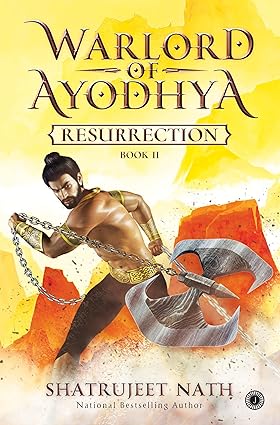Warlord of Ayodhya: Resurrection by Shatrujeeth Nath
My take on the book:
There was a sudden attack on Bharat and his son Taksha by unidentified entities; on the same night four men attacked dandapala Dileepa in the old quarters. The disappearances across Kosala and especially in Ayodhya have not ceased though the ones who vanished also returned back as if they never left — albeit they did not remember anything from the time they went missing.
Even after reinstating the homagriha, the magic in Ayodhya has been the weakest ever and the ensuing cold wave was wild claiming lives everyday. Simhika was executing her mission to weaken the magic in Ayodhya using her dark magic, with help of Nandana. The Gandhara and Kamboja Kings are hell bent on waging a war against the River kingdoms and grab them, especially Kekeya. Yuddhajeet had been exploring options on how to safeguard his kingdom.
Sudhanva has dreamt of the role of kshatri all his life, and when that has been denied to him, he does not stop from going to any lengths to make his dreams come true; that included killing his own family or starting rebellion against the throne. Lavanyasurya of Madhupura who has been at loggerheads with Bharat and Kosala would not let Bharat’s new proposed marketplace come up across Yamuna.
With multiple internal and external threats to his throne, will Bharat be able to keep up his promise to his elder brother Rama that he will keep Kosala safe till he returns back from exile?
This is the second book in the Warlord of Ayodhya series after Rebellion. When I started reading the second part I thought this is end of the series but the author surprised by keeping the story open at the end, hinting at the third part in the series. The story begins from where the first part ends, and though there are references to the first part, the reader would need to read first part to have a proper continuation to the story and understanding of the various characters.
As with the earlier book, Bharat’s many shades and emotions are well captured — his love for his son Taksha, his duty towards the citizens of Kosala, the constant self-introspection of his abilities as the King, meticulously facing internal administrative challenges, bravery while fighting the Rakshasas, fun side while teasing his mama, the desperation when compared to his father and elder brother, his leadership abilities while personally addressing rumors and unrest in Ayodhya.
Though Bharat is at the center of the entire story, the author deftly handles multiple parallel threads. While the first book establishes all the characters with a solid foundation for the overall story, the second book amazes with the twists. The action sequences are executed impeccably, the ones involving Yuddhajeet and the Bahlika warriors standout but the court scenes involving Bharat’s analytical skills are equally impressive. The highlight of the book is the racy pace without a single dull moment and even with so many characters the reader is never overwhelmed.
The concept of “magic” in Ayodhya keeps fascinating the reader. The author also reveals the truth behind the disappearances with an unexpected twist but does not conclude it, keeping the reader guessing. With Shatrughna also joining Bharat towards the end of this part, it will be interesting to see both the brothers in action in the third part.
Generally, sequels struggle to live up to the reader’s expectations after a good first book in the series, but this book is an exception — this one is even more better than the first book. There are many threads still open in this book and the author definitely has a tough job ahead to conclude and tie them all together.
A smashing sequel, Resurrection is definitely the best mythological fiction a reader could ask for.
My rating:
5/5.
